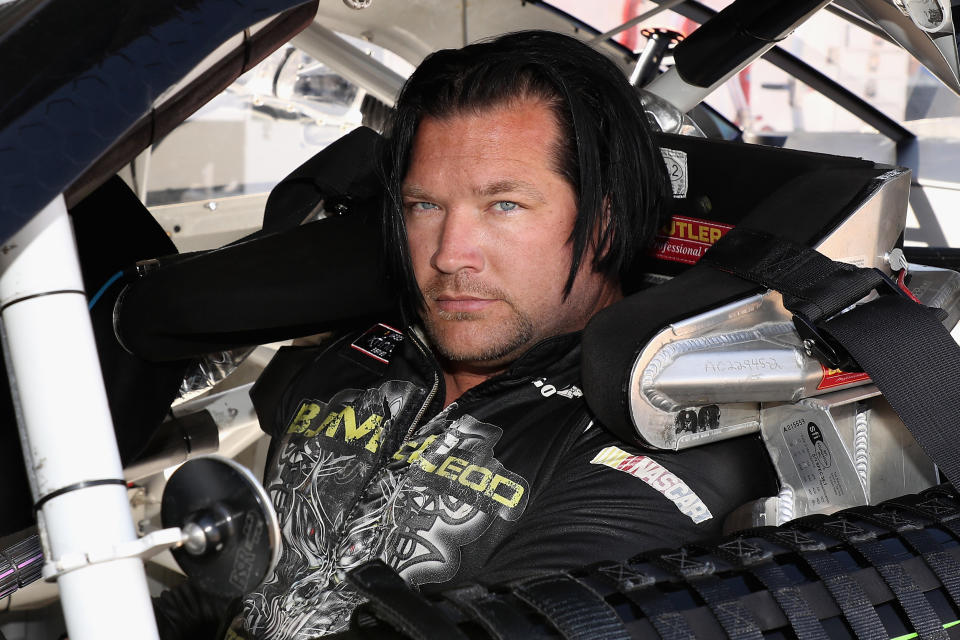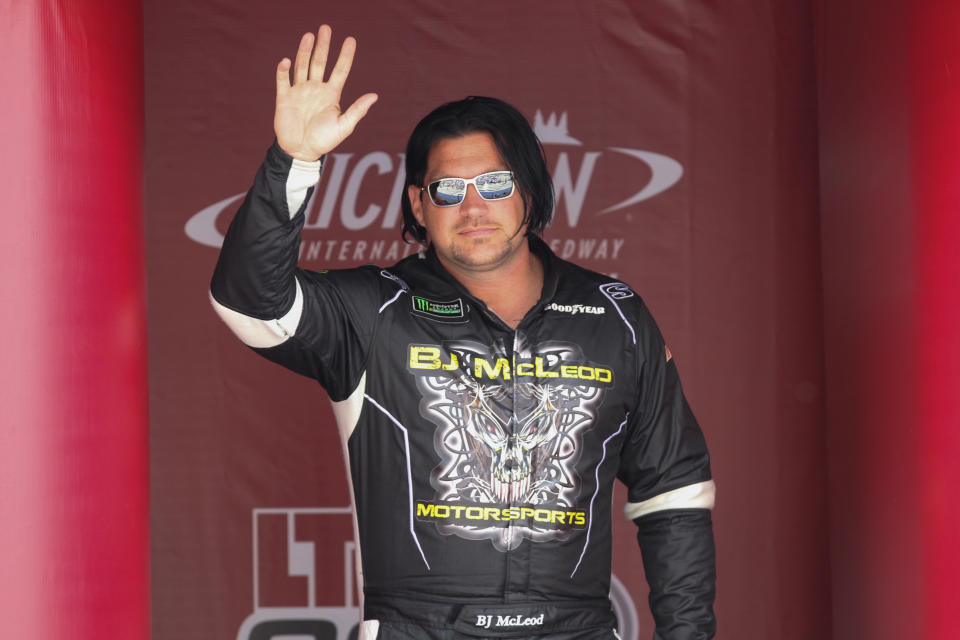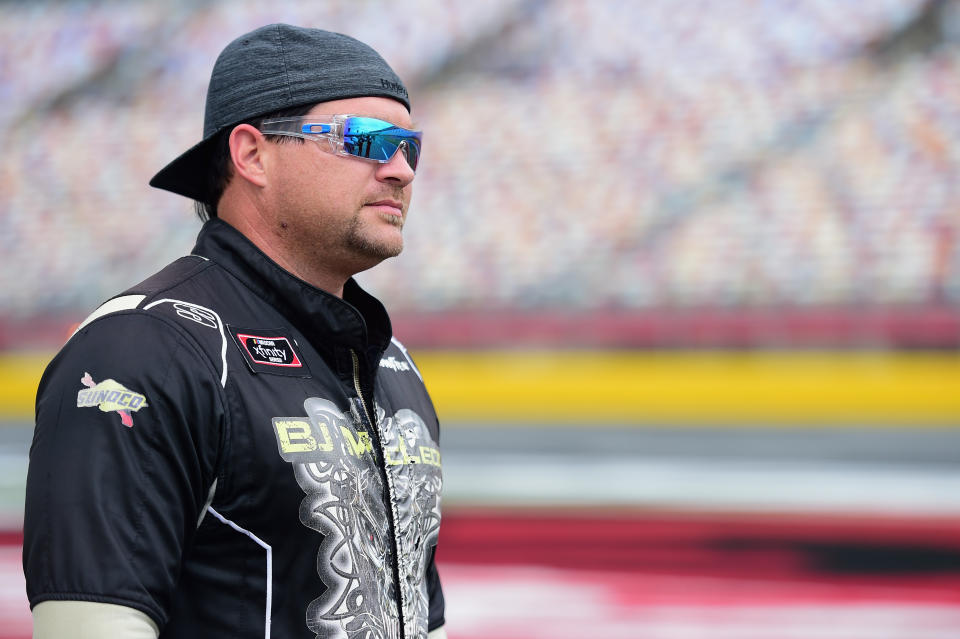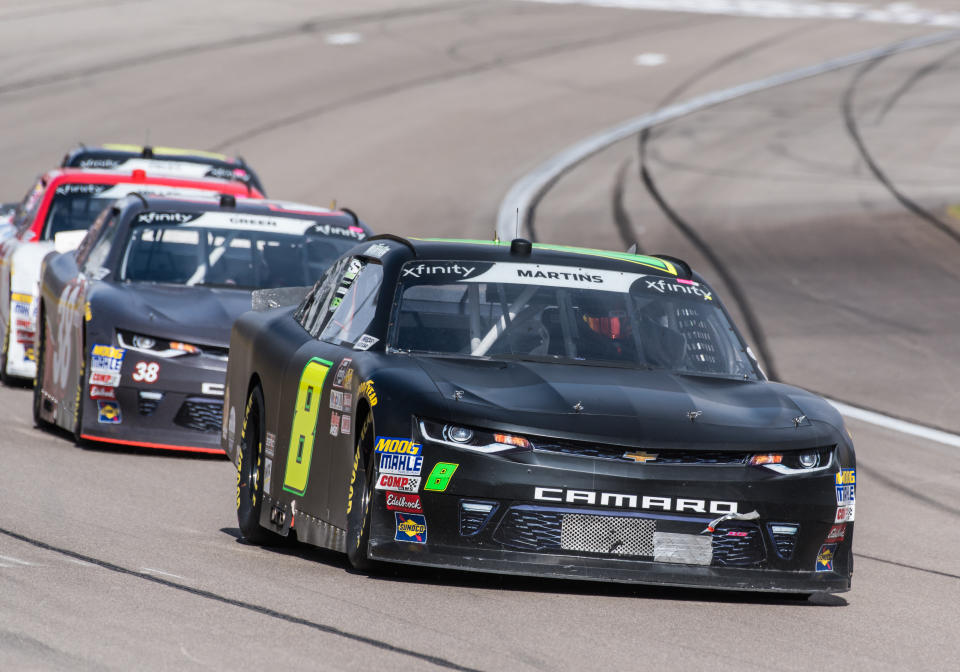How NASCAR's most unconventional owner has become an Xfinity Series mainstay

NEWTON, Iowa — The most unique man in NASCAR has been hustling since he got his first job at the age of 12 while he was being home-schooled.
“In that period of time from [age] 12 to 16, I was working at my shop,” B.J. McLeod said. “I was building race cars, I was helping my parents with a business they had, I was working in orange groves changing microjets, digging ditches with a shovel.
“I’ve done everything you can do and then either doing my schoolwork first thing in the morning or at night, whatever I felt like. When you start doing that at 12 years old you kind of learn how to manage. It’s pretty simple. It’s not — The best quote I’ve ever seen is if you buy stuff you don’t need you’ll soon have to sell stuff you do need.”
McLeod’s two-car team in NASCAR’s second-tier Xfinity Series is definitely a buyer. His cars are well-used and so are many of their sets of tires. At $2,200 a set brand new directly from Goodyear, five sets of tires can run a race team $11,000 for a weekend.
Many Xfinity Series teams, including McLeod’s, simply don’t have that cash. If they bought a weekend’s worth of new tires, they’d be broke or damn well close to it. So they make deals with well-funded teams across NASCAR’s top three series. Goodyear’s leasing structure means many bigger teams pay for their weekend allotment upfront, creating a second-hand market for those bargain-hunting.
McLeod is one of those who has proven adept at navigating that market, leveraging relationships built with crew members across the garage and a quid-pro-quo system of sorts when dealing with other Xfinity Series teams.
“There’s little things that go on between big teams and small teams,” McLeod said. “They help us out with a set of tires and we help them out with pit road. Because we’re usually — unfortunately our races are usually a lap down. So, let’s say that a top-five team says well, we’ve got an extra set of tires we’re going to turn back in. You take these tires, would you pick [a pit stall] in front of us because we’re more than likely going to be a lap down. It gives them an open out. Or an open in on their pit stop and that may be the difference in taking the lead with a green-white-checkered coming off pit road or being third coming off pit road.”
————————

Few casual NASCAR fans probably have any idea who McLeod is. As he stood behind pit road before Saturday night’s Truck Series race, he took off his backwards Hurley baseball hat, put his jet-black hair into a ponytail and put his hat back on. Wearing sunglasses and an Affliction shirt, he went unnoticed.
If you were asked to picture a NASCAR driver you’d probably think of someone like Joey Logano or Jimmie Johnson, guys with corporate sponsors adorning their pristine firesuits. When asked to picture a NASCAR owner you’d probably think of Roger Penske and Rick Hendrick, two gray-headed men worth more money than you can ever dream of who are always wearing perfectly-pressed button-down shirts.
McLeod would not fit with either of those mental images. His firesuit doesn’t have sponsors all over it, just the name of his team and its logo. That logo features what looks to be a combination of a skull and tribal markings. And can you imagine Penske or Hendrick in an Affliction shirt? The Affliction shirt McLeod was wearing as the truck race was about to start was what he’d been wearing underneath his firesuit for two Xfinity Series practices earlier in the day.
“I’ve always looked different,” McLeod said the next day, wearing a different Affliction shirt with a silver chain made up of skulls with red eyes hanging around his neck while sitting in the back of his team’s less-than-glamorous hauler. “I don’t know why. I’ve had this style since I was probably eight years old. I’ve just always never fit into anything that I was ever around.”
“I’m very comfortable being who I am and I’ve never changed it. One thing I like about owning my own team is I don’t feel weird for wearing my skull chain or having skull tattoos or anything like that. Because I do own my own team I’m not going to get fired.”
McLeod, 34, made his first NASCAR start in 2010 when he drove in a Truck Series race. Since then, he’s driven in over 100 combined Xfinity and Truck Series races. He’s made 12 Cup Series starts, including three this season. He’s never finished inside the top 10.
That’s largely because he’s spent most of his career driving for teams that don’t contend for wins. That includes his own team BJ McLeod Motorsports, which fields two cars in the Xfinity Series. He wasn’t driving for his own team on Sunday, however. He was in the No. 15 car for Johnny Davis, a longtime Xfinity Series owner. It was the second-straight week McLeod had driven a car that wasn’t his own.
“I had sponsored drivers for this weekend and that sponsorship money elevates my team. Unfortunately, I only had this much and somebody else had that much,” McLeod says holding his fingers together and then further apart. “So at that point, I say I’m not holding my team back by saying no to one of these kids or people that have sponsorship money, I’m going to let that come to my team and I’m going to sit on the sideline. We take that money and then we make the team better.”
————————

There’s one large rectangular garage building in the infield of Iowa Speedway. There are about 20 stalls on either side. Those stalls are assigned via owner’s points, which leads to a natural divide between the haves and have-nots with the best cars on one side of the garage and the cars struggling to make races on a regular basis on the other.
The haves in the Xfinity Series are teams from Joe Gibbs Racing, JR Motorsports and Richard Childress Racing. Their cars, for the most part, have corporate sponsorship on a weekly basis and seemingly have crew members everywhere. Each of those crew members has a specific task. These are the types of teams who are the sellers on the tire market.
McLeod’s team’s two stalls reside on the opposite side. He estimates he had eight people working on his two cars over the weekend; a paltry number of crew members for a single car on a bigger team. One of his crew chiefs, Keith Wolfe, also works for a Truck Series team and runs a trucking company during the week. Having a crew member specifically dedicated to taking care of tires is out of the question.
“It really is kind of like the island of misfit toys in a true sense,” Tommy Joe Martins, the primary driver of McLeod’s No. 78 said. “I feel like it’s the back of the pack All-Stars type of guys. It’s like whoever stood out on a really kind of rough team and then BJ gives them an opportunity to be a part of something that’s a little more structured and put together.”
The garage divide also nicely illustrates the competing goals of teams within the Xfinity Series. While the side with the haves features guys racing for wins on a weekly basis, the side McLeod’s team resides on is racing for something different.
“There’s not a lot of glamour in what we do. We’re running for 20th, 25th place,” Martins said. “It’s just not that sexy. It’s long hours and it’s on the road a lot and it’s not great pay. And there’s more downs to it than ups. But I think it also proves how much they really care about racing.”
20th place is significant in the Xfinity Series, where sponsorship is paramount and race purses don’t go much further than covering a tire bill for an entire race weekend. That’s why McLeod’s team counts on getting a weekly bonus from NASCAR to help pay the bills.
NASCAR awards a weekly payout to Xfinity teams in the top 30 in the owner’s points standings who show up to previous race and don’t field a top-tier Cup driver. According to the team, the bonus is $6,000. That can be $12,000 a race weekend for a two-car team like McLeod’s.
Over 33 race weekends that adds up to nearly $400,000.
“We have to [have the bonus] to stay alive. If we don’t do that we have to supplement income some other way, getting more sponsored drivers or more sponsors period,” McLeod said. “We have to make up the money another way.”
$400,000 may be the weekly primary sponsorship asking price for a top-level Cup Series team. In the Xfinity Series, it can be the buoy for a season-long budget.
“It could put you out of business,” he said of not getting the bonus. “It’s just that simple.”
Both of McLeod’s teams are inside the top 30 in owner’s points after Iowa despite neither car finishing in the top 25. The team is on pace to have both cars in the bonus all year for the first time in its existence.
————————

McLeod made the jump to the Xfinity Series in 2016 driving cars that were admittedly made up of years-old parts. It was a rough introduction. His No. 78 car had 13 blown engines. Not only was that affecting his team’s performance, it was affecting his bottom line. And the bottom line isn’t very far from a negative balance when you’re trying to start an Xfinity Series team without a financial backer.
“I didn’t want to quit. Never thought about it,” McLeod said. “Never once thought about quitting. I just thought about fixing it. I was definitely in a bad spot. It was not an easy thing to come out of and it was definitely one of the most stressful things in my life.
He switched to Chevrolet cars and started leasing engines from PME Engines in 2017. He got Martins to drive his car after cold-calling Martins’ father Craig, who was planning on running a partial Xfinity Series schedule with his son as the driver.
Martins drove in nine races for McLeod in 2017. He admits it was an arrangement he wasn’t expecting would ever happen.
“I knew BJ as really, more of a wheelin’-dealin’ type of guy honestly.” Martins said. “Yeah, I knew he had a team. Wasn’t sure how good of a driver he was. Didn’t really know a whole lot about him other than it seemed like he was a hoarder. He had just tons of used equipment … I knew that he was big with kind of wheeling and dealing on tires but I didn’t really give much thought to his team.”
“And so when the opportunity came up I was like yeah, cool and then I got to know him a little bit better. I think he just has that personality and really the appearance of a guy that would be a lot different than when you actually meet him in person. I don’t think the physical appearance and the way he looks really matches with his personality.”
That wheeling and dealing have helped McLeod stabilize his race team. None of his teams have failed to qualify for a race in over a year. But there’s a long way to the top of the Xfinity Series, and everyone on the team knows it.
————————

McLeod says he’s wanted to be a race car driver ever since he could remember. And his path to NASCAR was fairly straightforward, at least in racing terms.
He drove super late models for his family team and worked as a driving instructor, where he served as a driver coach for Xfinity Series regular Matt Tifft and four-time K&N Series winner Scott Heckert. He drove his first Truck Series race in 2010 and made his debut as an owner in 2014 in the Truck Series with Tifft behind the wheel.
Tifft finished eighth and was soon signed to drive for Kyle Busch Motorsports.
“It’s amazing what he’s done with the race team and where he came from, the late model team to the truck series to here,” Tifft, who currently drives for Richard Childress Racing, said. “One of the most fun personalities and definitely his style is himself. He’s very unique in that way but I think what’s so cool about him is he is a hardcore racer and he doesn’t give a crap about what anyone thinks of him and he just does what’s right for his team and his family.”
McLeod’s life path wasn’t as conventional. He only went to a traditional high school for a brief time so he could get his diploma and be eligible to get a driver’s license in his home state of Florida. Before getting into the Truck Series he started his own super late model team and then a K&N team.
“I’d say at a very young age I learned a lot about business. And racing is nothing but another business. The part we love is not a business. The part of getting in the car and filling the adrenaline and running 200 miles an hour, there’s no business at all to that. But everything that makes that happen is all business. And it don’t matter whether you’re first or 30th, it’s business that gets you to 30th or first.”
“My background and always being driven to make money and be independent and try to make stuff happen has just helped my racing career. it’s literally the only reason I have a team.”
————————

Martins, who started a blog when he was driving a limited schedule for his family team, has been one of the most outspoken voices about the imbalance between the top and the bottom in the Xfinity and Truck Series. He often notes how race purses — which are no longer revealed publicly — don’t make racing sustainable without sponsorship or drivers who bring money to a team. That forces teams like McLeod’s take sponsored drivers from time to time to help balance the books.
Pay drivers have become more common in NASCAR over the past few years as the costs for speed have risen far more than prize money has. With a dwindling television and at-track audience, sponsorship dollars are at a premium.
Competitive teams all throughout NASCAR, knowing how much it costs for consistent speed, are far more inclined to sign drivers who bring along corporate cash than they are to take a chance on a driver who isn’t bringing money to a team. The instances of a driver outdriving his equipment at the back of the field and moving up to a team with more resources are far less common than they used to be.
“It feels like before the recent era that was a little more open and it seemed like that side of the garage was looking for the next person on this side of the garage,” Martins said. “They’re just not now, they’re just not.”
“There is no development through the rough team and we bring you up and we’re going to give you a shot in a good car. That just doesn’t happen.”
There’s no sign of the environment in NASCAR changing anytime soon. Outside of a hard spending cap — a farfetched possibility — there are few ways to rein in team costs. And awarding more money to teams would require a restructuring of the way television revenue is shared among NASCAR, its tracks, and its teams. That restructuring isn’t on the horizon anytime soon.
“I don’t want anything handed to me,” McLeod said. “I wouldn’t be here without the help of big teams, small teams. People on all kinds of teams. There’s 10 teams on the other side of that garage that help me right now in different ways that if they didn’t I wouldn’t be here. And then there’s also [longtime truck owner] Bobby Dotter, for example. I wouldn’t be in the sport without him.”
————————

McLeod’s cars are currently 25th and 27th in the owner’s points standings and in a great position to secure that bonus on a weekly basis. But the No. 8 car in 25th is closer to 30th than it is to 20th. A win to get into the Xfinity Series playoffs would take an extraordinary set of circumstances.
While teams at JGR and JR Motorsports may have different cars for specific types of tracks, Martins has driven the same car in 75 percent of the season’s races to date.
“The weird part about our situation is where we finish really doesn’t matter nearly as much as if we finish. If we finish matters way more,” Martins said. “Yeah, we need the points, in the long game you need the points. You want to finish better, you need to finish better. In the short term, that 31st place — if we just sucked today and finished 32nd, that wouldn’t matter nearly as much as if I was racing for a top 15 and got turned and knocked the right side off the car. Because they’re planning on running my car next week or whatever. It’s got to run the next race.”
Racing progress is incremental when you don’t have an unlimited bank account. You have to first survive before you can succeed. Hell, McLeod’s team making it to a second and third seasons after engines blew up in a third of the first season’s races is a success story by itself. A rocky start like that would make less pragmatic teams disappear.
McLeod’s pragmatism extends to his future goals. He doesn’t have designs on going from a team scratching for the weekly bonus to one contending for wins in 2019 or 2020.
“I want to be a top 20 contender every week and once we get there I want to try to inch up to 15th,” McLeod said. “But once we get to that 15, it’s going to be really hard to ever jump that next hurdle. Because this is real. This is the second-highest stock car series in the world. It’s not a joke.”
Neither is McLeod nor his team. In an era of NASCAR where fans complain drivers are too corporate or bland because of their reliance on sponsorship money, McLeod stands out. And you can bet that he won’t be changing anytime soon.
“I’ll be honest with you, I’ve never talked to one owner that said hey, we won’t let you drive because you have an Affliction shirt on or you’ve got a skull chain or you wear your hat backwards or you’ve got a goatee,” he said. “Never heard that. It’s never been one thing that they’ve said. I think they support the different. And honestly most of the guys that I hang out with on the other side of the garage, they’re all like that’s cool man, don’t give it up. Always stay like you are.”
– – – – – – –
Nick Bromberg is a writer for Yahoo Sports.
Follow @NickBromberg on Twitter
More from Yahoo Sports:
• Female reporter sexually assaulted during live World Cup broadcast
• Sources: Charlotte ships Dwight Howard to Brooklyn for Timofey Mozgov
• Report: Top NBA prospects really don’t want to get drafted by the Kings
• Shams Charania: Kawhi Leonard meets with Coach Pop in Calif.

 Yahoo Sports
Yahoo Sports 

